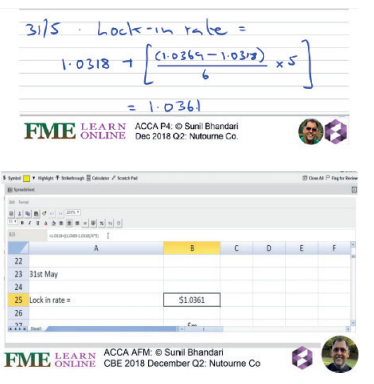July 2020
Sunil Bhandari puts the case for the Advanced Financial Management option paper.
Choosing your ACCA Strategic Professional Level option papers is
important. Your choice will be driven partly by necessity, partly
by your interests, partly by your comparative strengths and partly
by your future career progression. But may I ask you to keep in mind
the option paper’s comparative pass rate. There are so many ingredients that are needed to make the correct choice and ultimately achieve your target – to qualify.
AFM (formerly called P4) is one of your four choices. Unfortunately, I
can say very little about the other three option papers. May I leave that
responsibility to my fellow tutors who teach/specialise in those papers.
They act on behalf of their papers and I nod in due respect. I am the
advocate that is representing my client – AFM.
AFM is the ACCA’s introduction to the world of Treasury. The treasurer
is the spider at the centre of any major company’s web of relationships
– whether externally with bankers, shareholders and the markets, or
internally with subsidiaries competing for the next CAPEX dollar, or
precious liquidity. The currencies of AFM are project appraisal, risk
management and business valuations.
AFM practitioners are looking through the windscreen driving the
enterprise, and the changes wrought by the global financial crisis,
quantitative easing and the shifting sands of global political influence.
AFM seeks to give you the tools to make decisions, manage risk and
value entities. AFM is about solving real life problems with real life
solutions, and to boot it’s great fun.
Where does this story begin?
P4 launched in December 2007, with a ‘steady as she goes’ approach,
until the ‘infamous’ June 2009 paper. I’ll never ever forget that paper:
technically demanding and extremely time-pressured, it left an indelible stain on P4’s reputation with many tutors. June 2009 is 11 years ago, but to this day many will say “yes, financial management is interesting, but don’t sit AFM, it’s too hard”.
The way back from that deep abyss involved a new examiner and
a (welcome) change in style. P4 became ‘firm but fair’, and approved
ACCA P4 articles gave well-prepared students the guidance they
deserved. As the author of several of these articles, four of which
are still on the ACCA website, my brief was to make it practical and
relevant.
However, P4 retained its ‘tough’ reputation, and many students,
looking for the fastest route to qualify, chose option papers with higher
pass rates. This is perfectly understandable, but as stated above, is only one of several factors to accrue for when choosing your option papers.
All that changed with the September 2018 paper. Suddenly AFM
jumped to the front of the pack. So what happened?
A new 100% compulsory format made the exam fairer: before that
the question you chose could impact your chances. Now, you simply
decide the order you intend to attack the paper and ‘go for it’.
Clearer guidance: 2 of the 5 AFM syllabus areas will be examined
every exam: Advanced Investment Appraisal and Treasury and
Advanced Risk Management. Business Valuations is also a common
visitor. Students should always cover the whole syllabus, but some
‘some topics are more equal than others’.
A more predictable written content. Between 48% and 52% of
marks have been for theory/written content, often drawn directly
from an official ACCA technical article – for example, March 2020
Q1 references the article ‘Patterns of Behaviour’.
AFM ‘numbers’ became more susceptible to pro-formas, as long
as you recognised the ‘clues’ in the questions. Here, reading the
question carefully is key: what appears to be a unique question is
often asking you to apply familiar skills and techniques.
There is a clear pattern that AFM questions are predominantly being
sourced from what has been set in the past. For example, March
2020 could be traced back to similar questions from five previous
papers. History repeats itself.
These are all positive factors that have benefitted the students who
have attempted and cleared AFM. More importantly, they should be
noted by the candidates preparing for the future AFM exams – whether
that be paper based format or the new CBE.
However, there is an important point that students should note very
carefully. AFM candidates are still expected to be able to understand
some basic maths, irrespective of the exam format they are sitting.
For example:
1/(1+r) ^n = (1 +r) ^-n AND 3N = N^(1/2)
But what about CBE?
Computer based exams (CBE) will change everything. CBE exams require different skills as compared with their paper cousins. But each option paper will be impacted differently.
At the time of writing I’ve prepared videos debriefing 26 past AFM
exams. for my CBE question-based revision course, and aim to prepare
another 20 videos this season. My conclusion is that the ACCA CBE
spreadsheet makes ‘crunching the numbers’ in AFM much easier. The
photo shows the same question answered on paper and in the CBE
spreadsheet. Which do you think was quicker to prepare?

ACCA, to their great credit, have created a CBE practice site for you to
use. Those tutors who use that site can mark questions and exams they set for their students to practice. This is an invaluable resource. Watch this space for another article on how best to prepare for your AFM CBE exam.
‘My closing statement’
AFM puts accountants at the heart of doing business. For over 30 years
I’ve enjoyed making financial management accessible to students, and
getting them through their exams. The new CBE exam is going to make it even more fun.
Choose AFM because it’s interesting, fun and above all relevant. I rest my case.
• Sunil Bhandari is an online tutor with FME Learn Online.
See www.SunilBhandari.com



